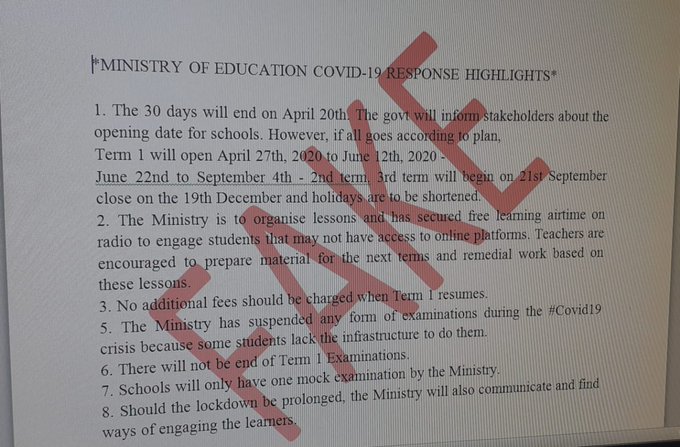All applicants wishing to be considered for admission to Diploma Teacher Training Colleges are invited to apply for the diploma in primary and childhood development teacher education course.
REGISTRATION FORMS AND APPLICATION PROCEDURE
Registration forms are now available and can be downloaded from the Ministry of Education’s website, www.education.go.ke.
Hard copies are available in the County Directors of Education (CDEs) offices. Duly filled registration forms should be submitted to Sub County Directors of Education Offices from Tuesday 23rd February to 7th March, 2021 by the applicants in person.
Those with special needs are also encouraged to apply.
Candidates are advised to register in only one Centre double registration will lead to automatic disqualification
REQUIREMENTS FOR REGISTRATION
The following are the recommended admission requirements for the Diploma in Primary and Early Childhood Development Teacher Education in Kenya.
a) Diploma in Primary Teacher Education (Grade 1-6) entry grade is KCSE Mean Grade
of C (Plain) or its equivalent with a C in the following cluster subjects.
i. English and Kiswahili;
ii. Mathematics;
iii. Humanities (Any);
iv. Sciences (Any).
b) For candidates with disabilities the minimum entry grade is C- (Minus) and a C-
(Minus) in the cluster of subjects stated above.
c) The duration of the course shall be three (3) years in accordance with the approved
Curriculum designs.
d) The Trainees shall be required to cover the recommended hours for coursework, required hours for practicum and pass the assessments as directed by Kenya National Examination Council (KNEC).
e) The Teacher Trainee shall undertake three months micro-teaching course which is a
pre-requisite for teaching practice.
The new Diploma in Primary Education (DPTE) Course duration
The duration for the diploma training shall be three years, according to the approved curriculum designs.
Specialization areas in the new Diploma in Primary Education (DPTE) Course duration
The teachers’ trainees will only specialise in three subject areas, having attained a minimum KCSE grade of C (Plain) in the learning areas they wish to focus on.
The areas for specialisation have been grouped into four clusters, but teachers will only pick one subject per category for specialty.
Candidates shall specialise from the first year in at least three learning areas preferably from any one of the four clusters.
Cluster one subjects in the new Diploma in Primary Education (DPTE) Course
- Kenya Sign Language
- Indigenous Languages
- Foreign Languages (German, French, Arabic and Mandarin (Chinese).
Cluster two subjects in the new Diploma in Primary Education (DPTE) Course
- Mathematics
- Home Science
- Agriculture
- Science and Technology
Cluster three subjects in the new Diploma in Primary Education (DPTE) Course
- Social Studies
- Religious Education (CRE, HRE, IRE)
Cluster four subjects in the new Diploma in Primary Education (DPTE) Course
- Art and Craft
- Music
Mandatory subjects in the new Diploma in Primary Education (DPTE) Course
- English
- Kiswahili,
- Physical and Health Education (PHE)
- Kenya sign language for hearing impaired.
Mandatory Learning areas in the new Diploma in Primary Education (DPTE) Course
The mandatory learning areas will build on the knowledge, skills, and attitudes of the young teacher for effective lesson delivery.
Evaluation criteria in the new Diploma in Primary Education (DPTE) Course
Those who will be approved to teach in schools will have completed the required hours for coursework and passed the stipulated assessment as directed by the Kenya National Examinations Council, Knec.
They will also be required to have completed the required hours for the practicum and passed the stipulated assessment as directed by Knec.
There shall be three months micro-teaching undertaken as a course and will be a pre requisite for teaching practice.
During this period, teacher trainees will prepare learning and teaching materials and short lessons, which they will try on their peers for practice and feedback.
Placement of teacher trainees
These trainees upon completion of the course will be registered and employed by the Teachers service commission (TSC) to teach in primary schools across the country.
Remember to check the TSC minimum requirements for teachers before enrolling for any teaching course. Check the requirements in the links below;
LIST OF APPROVED TEACHER TRAINING COLLEGES TO OFFER THE NEW DIPLOMA IN PRIMARY TEACHER EDUCATION COURSE.
Here is the list of the approved TTCs:
| S/NO. |
NAME OF COLLEGE |
| 1 |
MIGORI TTC |
| 2 |
ASUMBI TTC |
| 3 |
ST. PAUL’S NYABURURU TTC |
| 4 |
KENYANYA TTC |
| 5 |
BORABU TTC |
| 6 |
MURANG’A TTC |
| 7 |
KILIMAMBOGO TTC |
| 8 |
KAMWENJA TTC |
| 9 |
ARBERDERS TTC |
See full list in the document below;
[embeddoc url=”https://educationnewshub.co.ke/wp-content/uploads/2021/02/MINISTRY-OF-EDUCATION-APPROVED-COLLEGES-TO-OFFER-DIPLOMA-IN-EDUCATION-COURSE.pdf”]
Read also; Full list of all Teacher Training Colleges, TTCs, in Kenya
